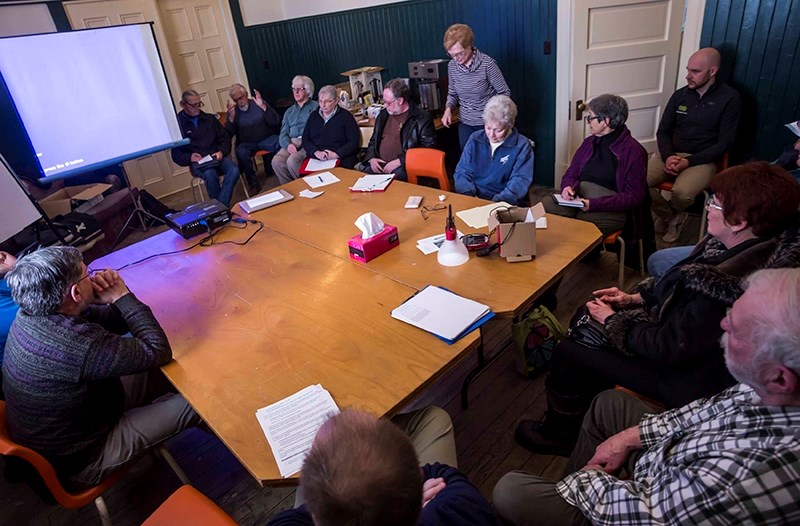Rather be a hammer than a nail
Athabasca Regional Renewable Energy Society reconvenes to talk solar energy and future projects
The Athabasca Regional Renewable Energy Society invited the community to partake in discussions about “simply living green” and climate change at a March 4 meeting.
The group of 15 people congregated in the west room of the Athabasca Train Station, and received information from an owner of a solar panel installation company, Athabasca-Sturgeon-Redwater MLA Colin Piquette’s office and a retired earth sciences professor.
Rosemary Neaves, volunteer co-chair of the society, kicked off the meeting by speaking about recent successes in the community, including seeing funding for solar panel installation at the new high school come through.
“Out of the letter campaign, it never ceases to amaze (me) how few people can sometimes make a difference,” she said.
Moving forward, the group is seeking out further opportunities for green initiatives in the community, she said.
James Good, Piquette’s constituency manager, shared about a new $36-million rebate program that was recently announced by the provincial government. This is expected to cover costs up to 30 per cent of solar installations on residential buildings and 25 per cent for businesses and non profits.
“The really good news is that this plan is expected to reduce green house gas emissions in the province by half a million times,” Good said.
Secondly, the government also announced a “no charge energy efficiency” program, which assists Albertans in switching to LED lighting, purchasing high efficiency showers and the list goes on, Good said.
Applications can be done for both programs at efficiencyalberta.ca.
Brandon Sandmaier, managing partner Generate Energy, presented about various solar energy systems he’s installed throughout the province. Before going back to school for NAIT’s solar installation program, Sandmaier was a heavy-duty mechanic at John Deere for about 10 years.
Sandmaier pointed out how quickly solar energy use is growing in the province, saying that in January 2016 there were 900 systems installed and operating, and now in 2017 he said the province sits at 1,600.
“You can see the exponential growth that’s happening,” he said.
Donald Kvill, professor emeritus of earth science at Athabasca University, spoke about people’s responsibility to act on climate change and what can be done about it.
Kvill said even though he himself has a solar panel system installed at his home, he is a pessimist in that he wonders if it is too late to make a dent in the increasingly accumulating greenhouse gases in the atmosphere.
“The inertia of the climate system is such that if we quit burning fossil fuels today – we all walked home – in a decade we wouldn’t be back to where we are today with greenhouse gases,” he said. “My solar panels aren’t going to save the planet.”
However, Kvill said he relates to lyrics in the Simon and Garfunkel song, “El Condor Pasa,” which say, “I’d rather be a hammer than a nail.”
“That’s what I feel, that’s why I put up my solar panels. I would rather supply something then take something out,” he said.
Kvill also said the tough thing about climate change is the inertia of it, and if humanity is going to start reversing some of the damage, then it needs to start now.
“It took us 150 years to get to where we’re at now. If we think we can change a few light bulbs and put up a few solar panels, it’s not going to happen. It’s a slow process, we’ve got to start undoing what we’ve done,” he said.
Harvey Scott, co-chair of the Athabasca Regional Renewable Energy Society, said he was pleased with what was gained from the meeting, and the society is going to start looking for further community initiatives to begin. The society will be inviting more speakers in the near future to talk about off-grid living, food security and more.
As far as future projects, Scott said some possibilities include looking into installing solar panels at the Athabasca Regional Multiplex, and cleaning up brown fields to be converted into solar fields.
“We’re looking at possible community projects that we might work together on and invite other community citizens and so on,” he said.



